Eduard Pötzl
Eduard Pötzl , pseudonym: Kleinpetz (born March 17, 1851 in Vienna , Austrian Empire ; † August 21, 1914 in Mödling , Austria-Hungary ), was an Austrian journalist and columnist.
Life
Eduard Pötzl, son of the kk notary Georg Pötzl, who immigrated from Moravia, and his wife Katharina, born. Aischer, from a family of vintners in Neustift am Walde (since 1892 district of Vienna), grew up in Wiener Neustadt and attended grammar school there, and after moving to Vienna then the Piarist grammar school , where he graduated . From 1869 to 1871 he was a civil servant at the Kaiser-Franz-Josefs-Bahn and also studied law at the University of Vienna from 1870 to 1873 . Due to the early death of his father and extensive loss of assets in the stock market crash in 1873 , he was unable to complete his studies and had to take care of the family's livelihood.
He initially worked briefly as a journalist for the Wiener Neustädter Nachrichten . From 1874 he was editor of the Viennese daily newspaper Neues Wiener Tagblatt , as a newspaper for a rather petty bourgeois audience, for a long time the highest circulation paper in Vienna, and was responsible for courtroom reporting until 1884. He then worked as a columnist; he shaped the cultural direction of the newspaper and became one of its most popular collaborators. When the right-wing extremist Georg von Schönerer and 27 allies invaded the NWT editorial office in Steyrerhof in 1888 to beat up the supposed Schandblatt Jews , the non-Jewish Pötzl also came to kiss the hand. From 1890 he lived in the Heiligenkreuzer Hof , where he collected Biedermeier furniture , a few steps away from the editorial office.
Pötzl wrote humoresques on life in Vienna and was known as a master of the local sketch. His sharply drawn descriptions of everyday life in Vienna met with a lively response from a growing readership. With the “Herr von Nigerl” Pötzl created a character of the Viennese philistine and with the “Gigerl” that of a fashion table . Pötzl was also one of the authors of the Wienerstadt compilation published in 1895 . Pictures of life from the present . His newspaper articles ( sketches ) were regularly summarized in books, which sold very well; In 1906 his complete works appeared in 18 small volumes with a foreword by Peter Rosegger .
When Mark Twain visited Vienna in 1897, Pötzl became the US author's most important reference person in Vienna. After Peter Payer , Pötzl and his environment were part of the aristocratic-bourgeois Ringstrasse society . Karl Kraus and Pötzl were very ambivalent about each other.
On March 3, 1911, on his 60th birthday, the Vienna City Council decided in recognition of his outstanding literary achievements that he would be granted tax-free citizenship . From 1912 on, Pötzl was hardly able to publish after suffering from meat poisoning; On March 26, 1913, his last article was published in the NWT , dedicated to his friend, the illustrator and painter Wilhelm Gause .
On August 23, 1914, he was buried in an honorary grave dedicated by the City of Vienna in the Vienna Central Cemetery (group 0, row 1, number 71); the grave monument of Josef Engelhart was unveiled on October 24, 1916.
In 1925 Josef-Friedl-Gasse was renamed Eduard-Pötzl-Gasse in his honor.
Works
- Viennese sketches from the courtroom (1884)
- Jung Vienna (1885)
- The People of Vienna (1889) online
- Viennese of today (1891)
- The Lord of Nigerl (1892)
- Viennese silhouettes (1892)
- Viennese Zeitbilder (1897)
- Hoch vom Kahlenberg (1898) online
- Contemporaries (1905) online
- Viennese sketches (1906)
- Vienna Days (1906) online
- Donauluft (1912) online
- Big city pictures: reports and feature articles - Vienna around 1900 , edited and commented by Peter Payer, Löcker, Vienna 2012, ISBN 978-3-85409-632-0 .
literature
- E. Life: Pötzl Eduard. In: Austrian Biographical Lexicon 1815–1950 (ÖBL). Volume 8, Verlag der Österreichischen Akademie der Wissenschaften, Vienna 1983, ISBN 3-7001-0187-2 , p. 149 f. (Direct links on p. 149 , p. 150 ).
- Marco Brociner : Eduard Pötzl. Literary German Austria. 4.1 (1904) # 3, 1-4. (With photography)
- Felix Czeike (Ed.): Historisches Lexikon Wien . Volume 4, Kremayr & Scheriau, Vienna 1995, ISBN 3-218-00546-9 , p. 585.
- Reinhard Müller : Eduard Pötzl (short biography with detailed catalog raisonné)
- Peter Payer : chronicler of the big city. On the 100th anniversary of Eduard Pötzl's death (1851–1914) , in: Wiener Geschichtsblätter , publisher, Verein für Geschichte der Stadt Wien , 69th year, issue 3/2014 , ISSN 0043-5317 , pp. 185–221
- (Obituary): V (inzenz) Chiavacci : Eduard Pötzl .. In: Oesterreichische Volks-Zeitung , August 30, 1914, p. 5 (online at ANNO ). .
- Hermann Bahr, Arthur Schnitzler: Correspondence, records, documents 1891–1931. Edited by Kurt Ifkovits, Martin Anton Müller. Göttingen: Wallstein 2018, ISBN 978-3-8353-3228-7 ( publisher presentation ) Four letters from Pötzl to Hermann Bahr
Web links
- Literature by and about Eduard Pötzl in the catalog of the German National Library
- Works by Eduard Pötzl in the Gutenberg-DE project
- Entry on Eduard Pötzl in the Austria Forum (in the AEIOU Austria Lexicon )
- Radio portrait of Eduard Pötzl in the Ö1 series “Chroniclers, Reporters, Enlighteners”, 2002.
| personal data | |
|---|---|
| SURNAME | Pötzl, Eduard |
| ALTERNATIVE NAMES | Kleinpetz (pseudonym) |
| BRIEF DESCRIPTION | Austrian journalist and columnist |
| DATE OF BIRTH | March 17, 1851 |
| PLACE OF BIRTH | Vienna |
| DATE OF DEATH | August 21, 1914 |
| Place of death | Mödling , Lower Austria |


